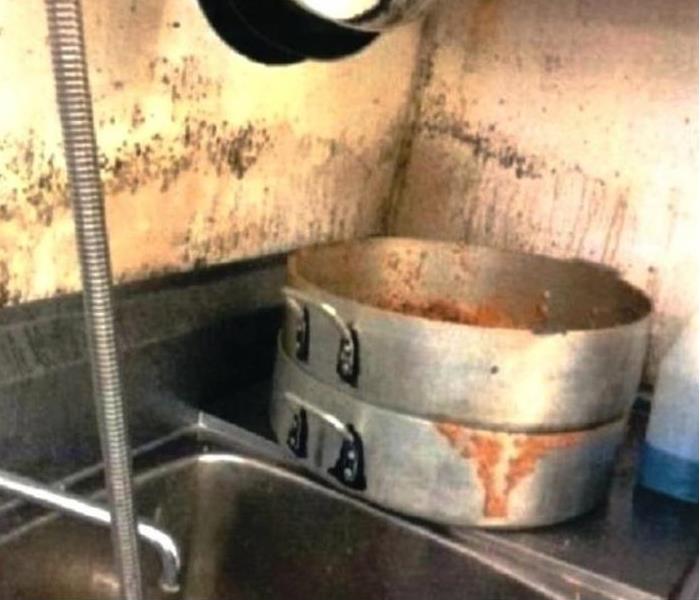How to Manage Black Mold Growth in Your Stratford, CT Restaurant Kitchen
5/6/2018 (Permalink)
 Not all black mold found in commercial restaurant kitchens is this obvious. It is often hidden behind baseboards, appliances and ceiling tiles.
Not all black mold found in commercial restaurant kitchens is this obvious. It is often hidden behind baseboards, appliances and ceiling tiles.
Mold found in the kitchen of your restaurant can have serious implications for your business.
Restaurant kitchens are some of the busiest work spaces. They function all day, every day, and require a smooth running operation to be successful. One malfunction, such as a freezer breaking down, a small grease fire on the range or a dishwasher not working, can throw everything off. Finding mold in your kitchen presents a host of challenges for restaurant owners. Quarantining food and prep surfaces in a high-volume restaurant can be a difficult task yet closing your restaurant during treatment is not a viable option.
Mold growth requires moisture, which is always found in commercial kitchens.
The number one ingredient that mold needs is moisture, which is always present in a commercial kitchen. The ever-running dishwasher from which water is sprayed, leaked and steam created is a major source of moisture in restaurant kitchens. Many kitchens have rubber floor mats, which effectively create a non-slip surface for kitchen workers, but also often trap water underneath and in the crevices. These mats are typically picked up when the floor is mopped at the end of the night but not always fully dry when they are replaced. Many kitchens have ceiling tiles, which are great in that they can be replaced if damaged, however can also be a breeding ground for mold spores due to their porosity. Ceiling tiles also trap dirt, which is a food source for mold. With multiple ice machines, refrigerators and freezers, commercial kitchens are also susceptible to supply line leaks, which can often go unnoticed until a mold infestation is discovered. No matter how carefully your restaurant kitchen is cleaned each night, it is a challenge to keep it dry enough to deter mold.
The best deterrent for mold growth in your kitchen is vigilance.
Working a weekly mold check into the kitchen cleaning schedule will help catch mold before it is a problem.
- Look behind each appliance for any leaks or puddles. Inspect that there isn't irregular condensation under or on the outside of freezers and coolers.
- A common place mold starts is the area is behind the vinyl baseboard, which sometimes lifts after time. Have baseboards inspected for any damage or moisture.
- Inspect ceiling tiles for discoloration that can be caused by a leaking pipe or faulty exhaust fan.
- Check the walls and floors around dishwashers and sinks for any signs of moisture- crumbling drywall, peeling linoleum or cracked tiles can all by caused by standing water.
- Also inspect bathrooms, which often share walls with the kitchen for any signs of mold as mold spores can infiltrate walls and move through the air from room to room.
Treating mold found in your restaurant kitchen.
Although mold found in a private home can be occasionally cleaned by the homeowners, mold found in commercial kitchens always requires professional remediation. At SERVPRO of Milford-Orange-Stratford, we don't like to use scare tactics in order to get business. However, mold in your restaurant kitchen can be a health hazard to your employees and your customers and if it is not contained and remediated properly, it can be seriously impact your business and your ability to keep your doors open. Our team is IICRC certified in mold damage remediation and experienced in commercial mold restoration in the New Haven County area. When we come to your commercial property, we will contain the area to stop the spread of mold spores and identify the sources of water that is causing the mold growth. Once moisture levels are down and the damaged material has been removed, we clean the air with air scrubbers to filter out the mold spores. When the mold remediation is complete, our construction team will replace wallboard, flooring, ceiling and any other material that required removal. We do all of this with the least disruption to your business continuity as possible.





 24/7 Emergency Service
24/7 Emergency Service